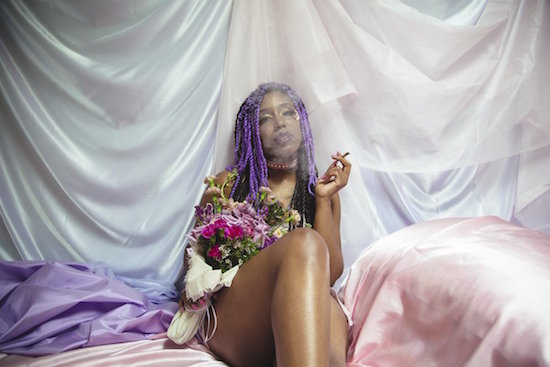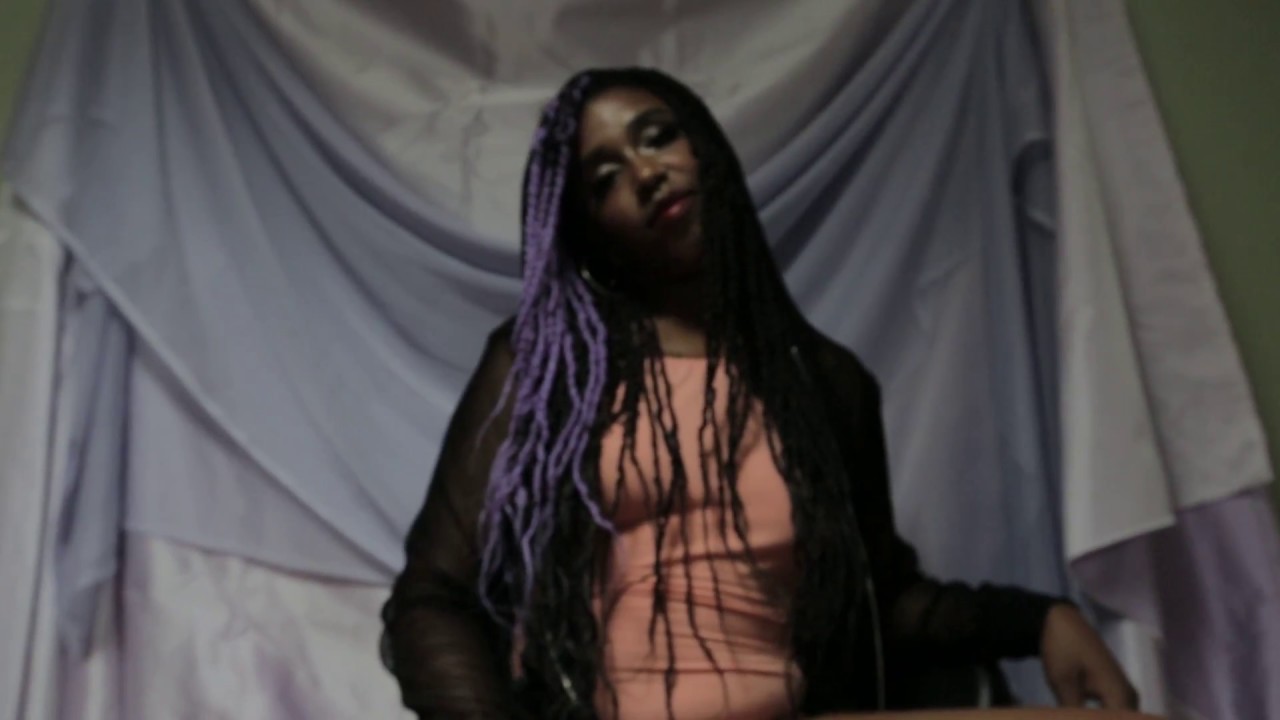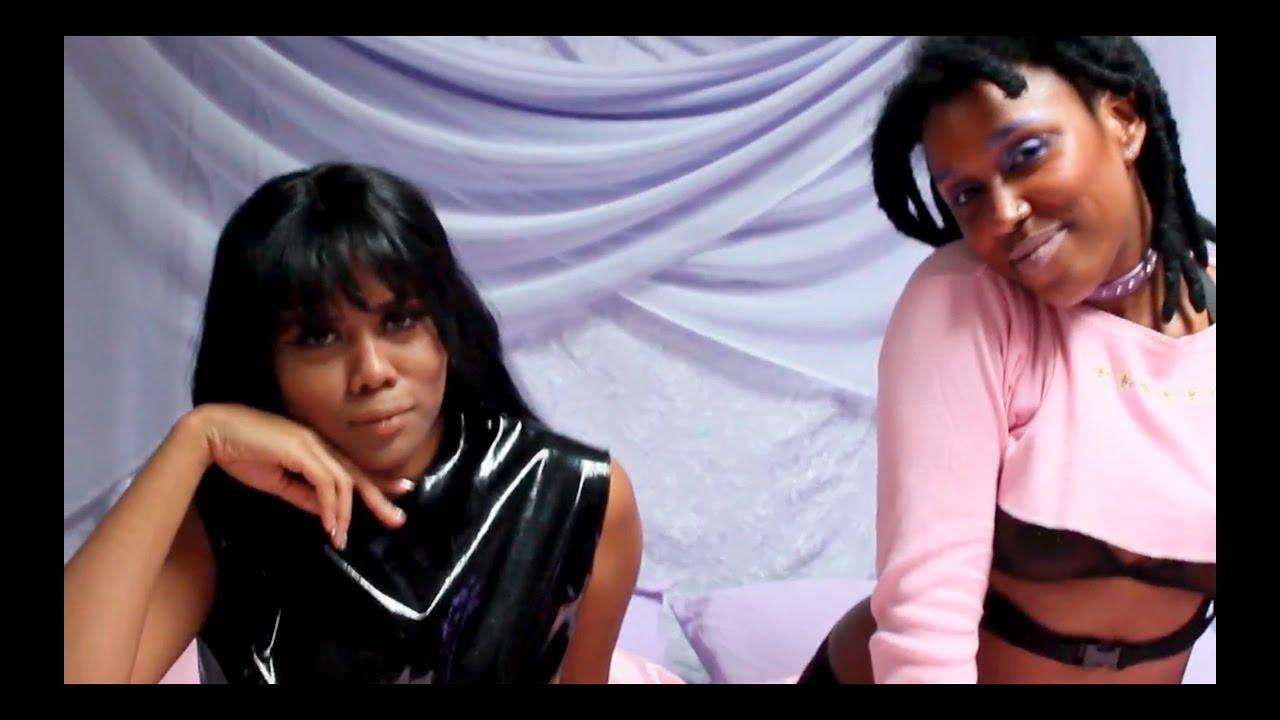Fantasii, the debut album by Mhysa is described by her “as an inversion of Dante’s Inferno”. The record follows her as she ascends to a rapture of dreams and desires, rather than descending to through nine circles of hell. It’s a pursuit to reclaim black femme and black queer power in body and sexuality, an album that sustains an air of contented vulnerability where its protagonist is powerful while remaining fragile.
Mhysa, is not entirely her own entity. She’s the alter-ego of E. Jane, an artist who’s both prolific and eclectic having toured and collaborated with artists such as Laurel Halo and Chino Amobi, working as half of the art duo SCRAAATCH, as well as creating the art exhibition Lavendra. E. Jane (who uses they/them pronouns) defines Mhysa as their alter-ego, an artist who homages black R&B divas with an air of devotional sensuality – with particular reference to Janet Jackson’s Velvet Rope, Donna Summer’s ‘Love To Love You Baby’ and Beyoncé’s ‘Naughty Girl’.
Those influences imply an alternative R&B aesthetic and this could very loosely apply to the tracks ‘Strobe’ and ‘Spectrum’. However, Fantasii shares more common ground with an artist like Klein – who’s known for using vocal looping and manipulation to create unsettling and at times jarring atmospheres.
Do you class Fantasii as a dance record?
E.J: I probably see it as more of a pop album than a dance album, but there are certainly club tracks like ‘Strobe’ and ‘Spectrum’. I was thinking a lot about Janet Jackson’s Velvet Rope while working on it. She made that record for the club. ‘Together Again’ is almost an ode to the gay club scene, some people call it an ‘Aids anthem’, paying tribute loved ones. Dance culture is a big part of my life and my coming of age, the club is the place where I feel most comfortable so my head is always there.
The first track ‘Special Need’ is a reference to The Velvet Rope.
EJ: Yeah, [Janet Jackson] is literally talking about a space that feels very queer, so I took snippets from that song and collaged it together, with some lyrics I wrote too. What I liked about that track was that it was just this statement that everyone wants to belong, that means people need to build spaces where they feel good. I was thinking about queer club space as a space where that need is met. That resonated with my journey of finding where I belong.
So is your queer identity a big part of your artistry then?
EJ: Expressing it for me is definitely important. Certain songs are biographical love songs, such as ‘Spectrum’ and ‘BB’ – they are both real stories, and even though they were written about situations with men, I made the pronouns androgynous [for instance changing boy to bae]. And in ‘BB’ when I say, “she just ain’t hittin’ it right” and that’s about this guy I used to date. I guess it’s just because I’ve been with women too, I just didn’t write a song about the hetero relationships. I’m not just interested in men and I wanted my music to reflect that.
I wanted to try and explore a more expanded spectrum of gender. So when I wrote these songs I was thinking about my own queerness, how I relate to bodies. Even with stuff like the voice pitching, I was playing around with the idea of gender. It’s a big part of my world, so it was inevitability going to show in my music.
So is ‘Strobe’ based on a real event?
EJ: Yeah, totally. I was complaining about getting out of bed and going to the club; I rung up Lawd Knows, my producer, and I was telling him, ‘I don’t really feel like it.’ I said the main line of the track, “So many pics it’s like I got my own strobe light”, and he said, ‘Shit that’s a song’.
I have a love-hate relationship with the club. There was this one incident, it was one of the first times I went to one of the ‘GHE20G0THIK’ parties, and people were taking so many photos of me. There were a lot of cameras flashing, but I was just trying to ignore it and tell myself it was a strobe; it’s [just] a fucking strobe. Sometimes I feel like people go to the club on safari nowadays. They’re not gay, they’re not queer they’re not there to dance – they just read about it online and want to watch.
I’ve seen you describe Mhysa as your ‘alter ego’, could you expand on that?
EJ: I mean she’s totally me, but she’s another version of me. I like to keep it weird and don’t think about it much. I always describe her as an amalgamation of experiences that I express through music and performance. I feel as though everyone can relate to that. Everyone, when they go to the club, is in an alter-ego space. How you act at work and how you work on the dancefloor are the opposite, and she thrives in the club space. She’s also a big part of my Lavendra Exhibition.
Could you tell me a bit more the Lavendra Exhibition?
EJ: Lavendra is an intimate installation I’ve been working on since grad school. Generally it gets shown as a solo show and the third iteration of it got shown on American Medium. It consists of collages and video work, sculptures and light installation concerning this mythology I created. It’s about space for black women – because we’re not safe on Earth. I created a place… it’s not a planet, it’s not a star, it was based on actual scientific phenomena, which are called brown dwarfs. The installation takes place on this brown dwarf, and the idea is that my alter ego [Mhysa] is making it habitable using the black diva’s voice. I use D.I.Y. homemade videos with a bad photo-booth green screen to illustrate this, and Mhysa performs in all of them.
I guess that’s where she was born, she’s a fictional pop star who inhabits this world. She’s gonna keep doing these videos because there are twenty-eight in the series and only three of them have been made.
You keep referring to Mhysa as a pop star, when most of the time she’s quite opposite.
EJ: I just do what I want – like Prince did. He was creatively free in his career. I’m even a bit like Kelis was when Kaleidoscope came out. It wasn’t that hot in the US but in the UK she was a hit. She was weird, like on purpose – that’s just how she is. I think if I look at mainstream pop I can understand this formula that people want from me but, I don’t really care.
Pop needs the underground anyway so it can steal ideas. Yves Tumor said ‘everyone wants me to make weird music, but I just wanna make pop’. I get that my music is weird, but it’s pop. I promise, I listen to Britney Spears all the time!
There’s definitely a pressure in experimental circles to avoid pop music.
EJ: Exactly, but I listen to Lemonade by Beyoncé all the time, I listen to Blonde by Frank Ocean all the time when we’re on the road. I feel really corny because I know I should probably be catching up on something more experimental but those records bang.
Lemonade has some underlying Afrofuturist inspiration, would you say you’re influenced by that?
EJ: Thinking about the future is important to me. Thinking about writers like Octavia Butler and her attitude towards it. Afrofuturism and futurism itself are big influences. I love the soundtracks of fantasy and sci-fi films too.
I think when working in electronic music or with technology you’re already in the future. Ryuichi Sakamoto didn’t have this technology in the 80s. I was watching this documentary about him the other day and he had these giant computers to make sound. Now we just work with things like Ableton. When producing I think a lot about industrial sounds, gentrification work sounds, and drill sirens in Philadelphia. You’re always hearing these sounds where I live, and you can also hear ambulances glaring. Things like that. I think the sounds I make are me reacting to my surroundings.
Finally, you describe the record as ‘an inversion of Dante’s Inferno’?
EJ: When I think about Dante’s Inferno, it’s basically this idea of someone carrying you through the depths of hell. I wanted to ask what it would be like to carry someone through your heaven. That’s why it’s called Fantasii. I’m a big daydreamer, I daydream really hard about really pretty things like that, and just imagine that beauty.
Mhysa plays Rewire festival in the Netherlands on Friday 6 April, for more details click here




